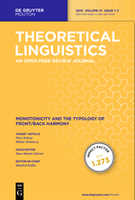
THEORETICAL LINGUISTICS
Scope & Guideline
Connecting Scholars through Language Exploration
Introduction
Aims and Scopes
- Theoretical Frameworks and Models:
The journal focuses on developing and analyzing theoretical frameworks that explain linguistic structures and processes. This includes formal grammar, syntax, semantics, and phonology, providing a comprehensive view of language. - Cross-Linguistic Perspectives:
A significant aim is to draw insights from a variety of languages to inform theoretical discussions, thereby enhancing the understanding of universal and language-specific phenomena. - Interdisciplinary Approaches:
The journal encourages the integration of perspectives from related fields such as cognitive science, philosophy, and computational linguistics, enriching theoretical linguistics with diverse methodologies and insights. - Empirical Foundations:
While primarily theoretical, the journal recognizes the importance of empirical data, advocating for a synthesis of theoretical and experimental methods to validate linguistic theories. - Innovative Linguistic Concepts:
The journal aims to explore and challenge established linguistic concepts, pushing the boundaries of theoretical linguistics by introducing novel ideas and frameworks.
Trending and Emerging
- Large Language Models (LLMs):
The incorporation of large language models into theoretical linguistics is a growing trend. This theme explores how LLMs can contribute to understanding linguistic theories, potentially reshaping the landscape of linguistic research. - Dynamic Inquisitive Semantics:
Emerging discussions around dynamic inquisitive semantics highlight a shift towards understanding language in interactive contexts, emphasizing how meaning is constructed in dialogue and discourse. - Social Meaning and Pragmatics:
Research focusing on the social dimensions of language, including social meaning, has gained traction. This reflects a broader recognition of the importance of context and social factors in linguistic theory. - Iconicity and Semiotic Complexity:
There is a rising interest in iconicity and its implications for meaning and structure in language. This theme suggests a growing acknowledgment of the interplay between form and meaning beyond traditional linguistic categories. - Empirical Turn in Theoretical Syntax:
The recent emphasis on the empirical turn signifies a trend where theoretical syntax is increasingly informed by experimental findings, bridging the gap between theory and data.
Declining or Waning
- Counterfactuality and Conditionality:
Research focusing on counterfactuality and conditional structures appears to be waning, with fewer papers addressing this traditionally rich area. This decline may suggest a shift towards more empirical or computational approaches in theoretical discussions. - Slavic Linguistics:
The specific focus on Slavic languages, while previously prominent, has diminished in recent issues. This may indicate a broader shift toward more universal linguistic theories rather than language-specific studies. - Traditional Syntax-Semantics Interface:
There seems to be a decreasing emphasis on classical discussions of the syntax-semantics interface, as emerging themes prioritize dynamic and innovative frameworks over established models. - Static Views of Language:
Research that adopts static or rigid views of language structure is less frequently published, reflecting a trend towards more dynamic and fluid representations in linguistic theory.
Similar Journals
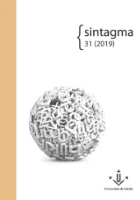
Sintagma is a prominent academic journal dedicated to advancing the field of Linguistics and Language, published by the Universitat de Lleida in Spain. With an ISSN of 0214-9141 and an E-ISSN of 2013-6455, this journal has established itself as an open-access platform since 1989, thereby ensuring wide accessibility and dissemination of research. The journal's commitment to quality is reflected in its ranking within the Q4 quartile of Linguistics and Language in 2021 and a similar standing in Social Sciences and Arts and Humanities, which underscores its emerging importance in these fields despite recent challenges. Covering topics that span theoretical inquiries to applied linguistic studies, Sintagma invites researchers, professionals, and students to contribute to and engage with its evolving landscape from its unique academic perspective. With the convergence of research years from 2011 to 2018 and upcoming issues through 2024, the journal remains poised to provide insightful content that addresses the linguistic dimensions of contemporary society.
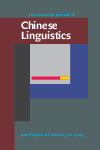
International Journal of Chinese Linguistics
Connecting Scholars in the Realm of Chinese LanguageInternational Journal of Chinese Linguistics is a distinguished publication that delves into various aspects of linguistic studies pertaining to the Chinese language. Published by John Benjamins Publishing Co, this journal stands out for its commitment to advancing the knowledge and understanding of Chinese linguistics within the global academic community. With an impact factor that places it in the Q2 quartile of linguistics and language, the journal is indexed in prominent databases, achieving ranks of #501 in Arts and Humanities and #580 in Social Sciences. These rankings reflect the journal's dedication to maintaining high scholarly standards and its relevance in both linguistic research and practical applications. While not categorized as Open Access, the journal provides necessary access through institutional subscriptions, thereby ensuring that valuable research reaches a broad audience. Covering a wide range of topics from syntax and phonetics to sociolinguistics and applied linguistics, the International Journal of Chinese Linguistics serves as an essential resource for researchers, professionals, and students seeking to deepen their understanding of the intricate relationship between language and culture in the Chinese context. With converging years from 2019 to 2024, it continues to evolve, reflecting ongoing developments in the field.
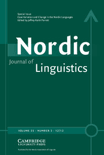
Nordic Journal of Linguistics
Connecting scholars through innovative linguistic studies.Nordic Journal of Linguistics, published by Cambridge University Press, serves as a prominent platform for the dissemination of cutting-edge research in the field of linguistics. Established in 1978 and spanning over four decades, the journal has curated a rich repository of scholarly work that reflects the dynamic and evolving nature of language studies. With an impressive Q2 ranking in both the Linguistics and Language category and a commendable performance in Scopus rankings, placing it at the 74th percentile among Arts and Humanities, the journal is recognized for its high academic standards and impact on contemporary linguistic research. Scholars and practitioners can access a variety of studies that delve into different languages, linguistic theories, and methodologies, fostering broader understanding and dialogue within the linguistic community. Although the journal does not currently offer open-access options, it remains an invaluable resource for researchers, professionals, and students keen on advancing their knowledge of language and linguistics.

Journal of Portuguese Linguistics
Navigating the Complexities of Portuguese LinguisticsThe Journal of Portuguese Linguistics is an esteemed peer-reviewed academic journal published by UBIQUITY PRESS LTD, dedicated to the exploration of the rich complexities of the Portuguese language and its various linguistic dimensions. With an ISSN of 1645-4537 and an E-ISSN of 2397-5563, this open-access journal has been disseminating valuable research since 2002, ensuring that knowledge is accessible to all scholars, professionals, and students interested in Linguistics. Based in Portugal, it features a distinct focus on the linguistics pertinent to the Portuguese language, facilitating discussions that span theoretical and applied interests. The journal holds a respectable Q3 quartile rank in the field of Linguistics and Language, reflecting its growing significance and contribution to academia, as evidenced by Scopus rankings that place it in the 71st and 68th percentiles in Arts and Humanities as well as Social Sciences. Researchers and practitioners alike will find Journal of Portuguese Linguistics to be an indispensable resource for fostering discourse and innovation in the study of language.
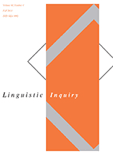
LINGUISTIC INQUIRY
Innovating Conversations in Language StudiesLINGUISTIC INQUIRY is a premier journal published by MIT PRESS, representing a critical platform for the advancement of research in the fields of linguistics and language studies. With an impressive Q1 category ranking in both linguistics and language disciplines for 2023, and ranking #149 in Arts and Humanities and #174 in Social Sciences according to Scopus metrics, this journal stands at the forefront of academic conversations around language theory, analysis, and application. LINGUISTIC INQUIRY caters to a diverse audience of researchers, professionals, and students, providing a robust forum for original research articles and theoretical discussions that push the boundaries of our understanding of language. While the journal currently does not offer open access, it remains an essential resource for those engaged in cutting-edge linguistic research. The journal's continuous publication since 1996 demonstrates its long-standing commitment to linguistic scholarship and innovation.

Language and Linguistics
Exploring the Frontiers of Language and ThoughtLanguage and Linguistics is a leading academic journal published by ACAD SINICA, INST LINGUISTICS, based in Taiwan. Established in 2008, this journal has rapidly gained recognition within the field of linguistics, achieving a commendable ranking of Q2 in the 2023 category quartiles and holding positions in the top percentiles of Scopus rankings for both Arts and Humanities and Social Sciences. With an ISSN of 1606-822X and an E-ISSN of 2309-5067, the journal aims to foster the development of linguistics research by providing a platform for the dissemination of innovative and interdisciplinary studies. While it currently operates on a traditional subscription model, its significant contribution to the advancement of linguistic theory and its applications makes it an invaluable resource for researchers, professionals, and students alike. Spanning converged years from 2008 to 2024, Language and Linguistics continues to shape the dialogue in understanding language phenomena and encourages submissions that push the boundaries of current linguistic knowledge.

JOURNAL OF EAST ASIAN LINGUISTICS
Unveiling the Richness of East Asian LanguagesJOURNAL OF EAST ASIAN LINGUISTICS, published by SPRINGER, is a premier academic journal that focuses on the rich and diverse linguistic phenomena from East Asia. With an ISSN of 0925-8558 and an E-ISSN of 1572-8560, this journal has steadily contributed to the fields of linguistics and the history and philosophy of science since its inception in 1992. Operating from its base in the Netherlands, the journal is recognized for its impactful research, holding a Q2 category ranking in both the History and Philosophy of Science and Linguistics and Language. It boasts an impressive standing in Scopus rankings, highlighting its relevance and contribution to the academic community with a 66th percentile ranking in Language and Linguistics. The journal is not currently open access, ensuring a rigorous peer-review process that elevates the quality of published articles. By bridging theory and empirical research, the JOURNAL OF EAST ASIAN LINGUISTICS plays a vital role in advancing knowledge in linguistics, making it an essential resource for researchers, professionals, and students interested in East Asian languages and their complexities.

Annual Review of Linguistics
Exploring the Frontiers of Language ResearchAnnual Review of Linguistics is a premier scholarly journal dedicated to advancing the field of linguistics through comprehensive and insightful reviews of current research and emerging trends. Published by ANNUAL REVIEWS, this journal is recognized for its high impact, evidenced by its Q1 ranking in the Linguistics and Language category and exceptional placements in the Scopus Ranks, positioning it in the top 2% of its field. Since its inception in 2015, the journal has served as a vital resource for researchers, professionals, and students seeking to deepen their understanding of language theories, acquisition, processing, and sociolinguistics. With no Open Access currently available, the Annual Review of Linguistics is esteemed for its rigorous peer-reviewed articles that synthesize a wealth of knowledge, making it an indispensable tool for advancing research and dialogue within the linguistic community.
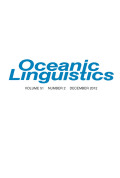
OCEANIC LINGUISTICS
Celebrating the Vibrancy of Pacific LinguisticsOCEANIC LINGUISTICS is a premier academic journal published by UNIV HAWAII PRESS, dedicated to the study of languages spoken in the Pacific region. This esteemed journal, bearing ISSN 0029-8115 and E-ISSN 1527-9421, serves as a vital platform for linguists, researchers, and scholars to disseminate significant findings and insights related to Oceania's rich linguistic diversity. With a commendable impact factor and categorized in the Q2 Quartile for the field of linguistics and language, OCEANIC LINGUISTICS ranks 335th out of 1088 in Arts and Humanities and 395th out of 1167 in Social Sciences, reflecting its relevance and influence in ongoing linguistic discourse. The journal is a subscription-based publication, committed to advancing research and fostering scholarly communication from 2004 to 2024, making it an essential resource for anyone engaged in the study of linguistic phenomena in the Oceania region and beyond.
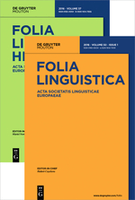
FOLIA LINGUISTICA
Pioneering Research at the Forefront of LinguisticsFOLIA LINGUISTICA, published by WALTER DE GRUYTER GMBH, is a premier scholarly journal dedicated to the field of linguistics. Established in 1967, the journal has consistently provided a platform for innovative research and scholarly discourse in language and linguistics, contributing significantly to the academic community's understanding of language structures, usage, and cognitive processes. With its classification in the top quartile (Q1) of linguistics and language in 2023, FOLIA LINGUISTICA holds a respectable rank (#282/1088) within the Arts and Humanities category and an admirable percentile rank of 74th, ensuring its position at the forefront of linguistic scholarship. Researchers and academics from around the globe can access a wealth of knowledge and cutting-edge research findings through this esteemed publication, which is vital for anyone looking to engage with the latest advancements in linguistics. Located in Berlin, Germany, FOLIA LINGUISTICA encompasses all aspects of language research, making it an indispensable resource for researchers, professionals, and students alike seeking to deepen their understanding of language and its complexities.